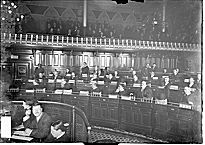| Entries |
| A |
|
Aldermanic Privilege
|
Aldermanic privilege refers to the power of Chicago city council members (aldermen) to initiate or block city council or city government actions concerning their own wards. Sometimes written into official council rules, it is often based on unwritten understandings among members or on arrangements with city administrators who find it expedient to routinely comply with aldermanic requests.

|
Aldermen, in turn, typically exercised this power only with the approval of their party's ward committeeman. Those aldermen who were also committeemen acted as “little mayors” of their wards. Reformers objected that aldermanic privilege led to inconsistent application of ordinances, legislative inefficiency, and outright corruption.
Aldermanic privilege reached its zenith in the mid-twentieth century. In 1955, however, Mayor Richard J. Daley centralized zoning variation and driveway permit procedures, denying aldermen veto power and concentrating decision-making in the hands of expert city officials. But changes in the zoning ordinance remain the prerogative of the council, and in the 1980s and '90s members could block city sales or acquisitions of property in their wards. Scandals spurred adoption of an ethics ordinance in 1997, making the exercise of aldermanic privilege more transparent but not eliminating it.
The Encyclopedia of Chicago © 2004 The Newberry Library. All Rights Reserved. Portions are copyrighted by other institutions and individuals. Additional information on copyright and permissions.